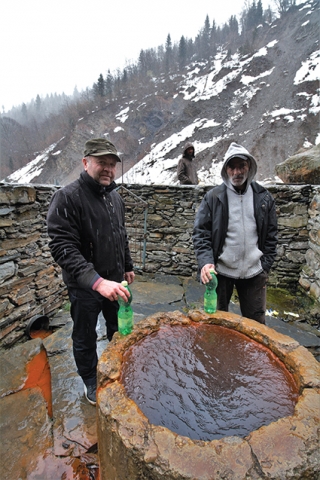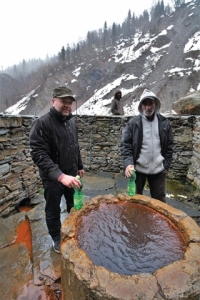First Visit: Tskhumari, Svaneti
So my wishful thought of the previous article proved to be untimely: what was forecast rather optimistically online as “rain” turned out to be “snow”, coming down in several periods since the article was published and now as I write this one. No one expects it to last long, as the general trend is warming. But we’re feeling sorry for our poor confused cows, who a few times now have begun grazing in our fields, only later to find them buried again under the white stuff.
One very pretty result has been the layering effect. In this, the upper landscape is whitened as if by a judicious sprinkle of icing sugar, while the lower remains greening: two seasons for the price of one! Get it while it lasts! I’m hoping that a good view of this type of scene including the elusive Mt. Ushba will give my lens what my eyes already envision; tomorrow’s clearing forecast for the morning looks promising.
This week I also began exploring the village of Tskhumari for the first time ever. This is mostly due to the presence there of a friend, an outsider like myself although only from another part of Georgia instead of from overseas, but a foreigner nonetheless. He visits occasionally, in search of good things to do in a needy place, which this seems to be. We might well partner in such exploits.
Tskhumari lies mostly across the Enguri River from us, and the long road down, over and back up to it begins from the other side of Becho; I drove there today in my trusty, powerful Toyota 4Runner, which never missed a beat. Asking directions several times, eventually I ended up in the right place, near the end of the place, and met my friend’s hosts who, he says, are like other parents to him. The man told me that one part of Tskhumari is even mentioned in Strabo’s famous writing of the Svans in his Geography of some 2000 years ago. This is an impressively antique mention indeed, in a region where such things are discussed in deadly earnest.
A new view of Ushba also was promised to me, although today’s snowing atmosphere prevented this from my sight. It’ll keep! We walked the short distance to a nicely walled-in mineral water spring near a river, bubbling with its own carbonation and quite delicious. I noted as neutrally as I could the (to me) glaring dichotomy of the liberal strewing of plastic bottles thereabout, and a discussion began on the spot about a near future “subbotnik” (Soviet-era “voluntary” beautification day). Yes, I know, you have nowhere designated to dump your rubbish, no collection service either, &c, &c. And neither is it your most pressing issue, in the face of struggling to exist at all.
Tskhumari has my sympathy for one big reason: for more than a month of midwinter, it gets no sun at all, due to its situation on the mountainside and Sol’s failing to clear said mountain at all during the days of this period. We in upper Etseri, on the other hand, are bathed in the rays daily during the same period, for at least seven or eight hours, making a considerable difference to our heating.
I said my goodbyes and left after several hours, knowing that in better weather this is a friendship which must continue indefinitely. On my way out, the other side of the main bridge revealed to me a horrific memorial: eleven people killed in one tragic accident there in 2005, portraits immortalized together on one piece of stone with all their dates of birth and death. What agony.
So, yes, I have just begun to scratch the surface of Tskhumari’s multi-faceted personality. But it was a good start. Now, relationships and the pull of that new view of Ushba will take me back there.
Tony Hanmer has lived in Georgia since 1999, in Svaneti since 2007, and been a weekly writer for GT since early 2011. He runs the “Svaneti Renaissance” Facebook group, now with over 1350 members, at www.facebook.com/groups/SvanetiRenaissance/
He and his wife also run their own guest house in Etseri:
www.facebook.com/hanmer.house.svaneti
Tony Hanmer












